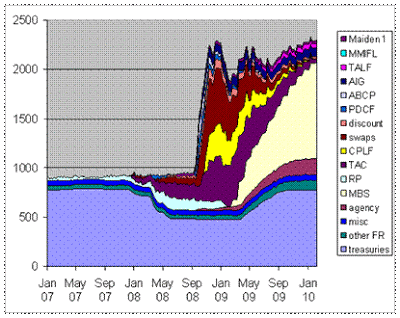Hussman Weekly Market Comment: The Federal Reserve's Exit Strategy: Unlegislated Bailout of Fannie and Freddie
If one is alert, it is evident that the Federal Reserve and the U.S. Treasury have disposed of the need for Congressional approval, and have engineered a de facto bailout of Fannie Mae and Freddie Mac, at public expense.
Below is a chart of the composition of the Federal Reserve's balance sheet, in billions of dollars. Against these assets, the Fed creates currency and bank reserves, which comprise the "monetary base." Clearly, the volume of Fed-supplied stabilization funding in the system is still enormous. As James Hamilton has observed, "it seems not coincidental that, when you look at the total of all the assets the Fed is holding, the expansion of MBS purchases exactly offsets the declines from phasing out the short-term lending facilities. As a result of the MBS and agency purchases, the total assets of the Federal Reserve today exceed the total reached at the peak level of activity for the lending facilities in December 2008."

My impression continues to be that current concerns such as the Greek debt crisis are far less important that the incipient backlog of foreclosures and mortgage losses we are likely to observe on all classes of adjustable rate mortgages in the next few quarters. The latest report from RealtyTrac, for example, notes " January foreclosure numbers are exhibiting a pattern very similar to a year ago: a double-digit percentage jump in December foreclosure activity followed by a 10 percent drop in January. If history repeats itself we will see a surge in the numbers over the next few months as lenders foreclose on delinquent loans where neither the existing loan modification programs or the new short sale and deed-in-lieu of foreclosure alternatives works.”
Frankly, it is too early to declare that the government interventions in the financial markets last year "worked." They were certainly effective over the short run, particularly in fostering a significant reduction in the level of investor risk aversion. But to "work" in a larger sense would require that we've solved the problem in a way that will allow us to avoid a second round of credit losses and institutional insolvencies. The evidence on that is unconvincing. The rate of mortgage delinquencies is currently more than double what it was a year ago, even without the impact of Alt-A and Option-ARM resets that can be expected to substantially amplify those difficulties this year. In January, delinquency rates on commercial mortgage backed securities jumped by a greater amount than in any prior month of the recent downturn. Though we've observed a great deal of forbearance in translating those delinquencies into new foreclosures, it is unlikely that this gap between delinquencies and foreclosures will persist much longer.
In short, the Greek debt crisis is interesting in its own right, but I suspect that it is not the most important story to follow.
- Hussman Weekly Market Comment: Topping Patterns And The Proper Cause For Optimism
Link to: Topping Patterns and the Proper Cause for OptimismNotes to the FOMC The following are a few observations regarding Dr. Yellen’s testimony to Congress. The objective is to broaden the discourse with alternative views and evidence, not to disparage...
- Hussman Weekly Market Comment: The Reality Of The Situation
For nearly two years, the massive interventions of central banks have repeatedly pulled a fundamentally weak and debt-burdened global economy from the brink of resumed recession. The Federal Reserve's balance sheet is now leveraged 52-to-1, with assets...
- Hussman Weekly Market Comment: Earning More By Setting Aside Less
Meanwhile, it is notable that the "favorable" earnings reported by J.P. Morgan and Bank of America in the first quarter were due to reduced provisions for credit losses - charges that are largely discretionary. In the fourth quarter of 2009, J.P. Morgan...
- Hussman Weekly Market Comment: Timothy Geithner Meets Vladimir Lenin
Last week, while Congress and the nation were preoccupied with the holidays, the Treasury made a Christmas eve announcement that it would be providing Fannie Mae and Freddie Mac unlimited financial support for the next three years. The Treasury's...
- Wsj: First, Let's Stabilize Home Prices - By R. Glenn Hubbard And Chris Mayer
We are in a vicious cycle: falling housing values cause losses on securities, which reduce bank capital, thereby tightening lending and causing house prices to fall further. The cycle has spread beyond housing, but housing is the place to fix it. Housing...

